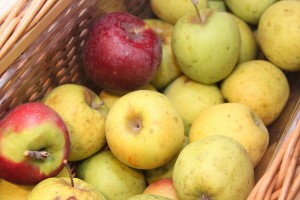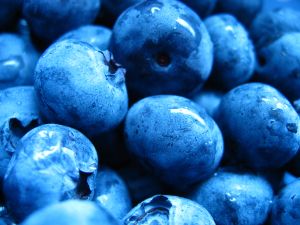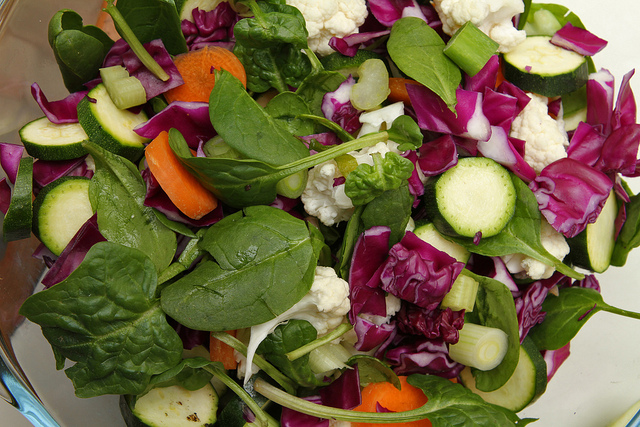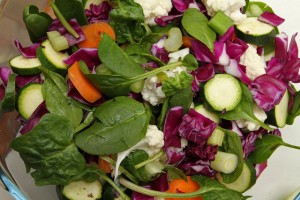No, really. I’m not the girlfriend at the table who whips out the calculator when we’re all out dining together (you know who I’m talking about) but I am the one who has a close eye on all the sales, will frustrate the cashier at the store with a handful of coupons and has no problem “negotiating” down the price on a product… regardless of how long it takes or who it holds up.
I look at it like this – I save where I can, so I can spend where I need.
So, when I first learned about eating healthy and “organic foods,” you can imagine the sticker shock I endured when I first saw those price tags. No, really. I was pretty pissed. At first, I truly didn’t understand it. What justifies adding an extra dollar and some change to the per pound weight of spinach just because it’s organic?
Then…I did some digging.
On this site, I talk a lot about the harmful chemicals inside of our processed food items, how poorly our bodies digest them, and how they negatively impact our health (and, ultimately, our weight.) There are chemicals in our food that alter our thought patterns, chemicals that make us think one thing is truly another and chemicals that, without question, are actually used harmfully (even fatally) in other contexts. Why would our fruits and vegetables be any different?

Look at it this way – sure, pesticides may be an important part of keeping bugs off our food, but what do those chemicals do once they hit the ground? What happens when they seep into the soil and wind up elsewhere? If we’re still not 1000% sure (and by that I mean sure without a doubt) about these chemicals, why support their use? That’s where buying organic comes in.
To purchase something as organic means that it is certified t have not used pesticides or other harmful chemicals in the growing of that product. This is great, but… is it always necessary? Do I have to buy everything organic?
No!
If you are a budding die hard environmentalist, you may decide that you don’t want any of your money encouraging the use of pesticides, and that’s okay. For others, the goal may be to merely get their feet wet in the world of organics and make a small leap instead of diving head first.
Realistically speaking, I prefer it this way. I didn’t dive head first into organics. I only bought a few things here and there. The more I started cutting out other crap in my diet, the more room my budget had to purchase other things. That’s okay. Baby steps.
So what things should you buy organic, and what can you bypass? For me, there are three simple rules of thumb you can apply across the board in regard to what should and shouldn’t be bought organic if you’re seeking to avoid pesticides. Have at ‘em:

If it says organic on a box, reconsider your purchase – buying organic fruits and veggies is one thing, but buying organic processed foods? Not only are you going to pay a premium for it, you’re still buying a processed food! Having “organic” stamped on the side doesn’t automatically erase the issues that come with processed foods, it doesn’t automatically make the food healthier and it certainly doesn’t take away the “junk food” label. Oh, yes. There is organic junk food. “Organic” doesn’t mean “healthy.” It means “no pesticides, not a clone food.” It’s not a free pass.
Besides, there’s also this:
Products made entirely with certified organic ingredients and methods can be labeled “100% organic”. Products with at least 95% organic ingredients can use the word “organic”. Both of these categories may also display the USDA organic seal. A third category, containing a minimum of 70% organic ingredients, can be labeled “made with organic ingredients”. In addition, products may also display the logo of the certification body that approved them. Products made with less than 70% organic ingredients cannot advertise this information to consumers and can only mention this fact in the product’s ingredient statement. [source]
The more exposed the edible parts of the food, the more important it is to go organic – just like the first rule was pretty easy to understand, this one is the same. Think berries, apples, peaches, grapes, pears, cucumbers, leafy greens. I’ll never forget the day that I bit into a cucumber that I just cleaned, and my tongue went numb. No, thank you. If you’re cringing at the thought of buying your favorite foods at a higher price, do yourself a favor and buy them in-season. They’re cheaper, then.
Now, there are other elements to buying organics – I didn’t even mention clone foods, animal or animal by-products, here, but just you wait – but as far as pesticides on fruits and veggies goes, this is a great start for a beginner who wants to try.
Want some more resources? Greenopolis has a pretty clear list of what you can get away with purchasing while escaping the organic sticker shock, as well as explanations that can help you better understand the thought process behind your purchases. The Environmental Working Group also has a list of fruits and veggies ranked from best to worst as far as what can be purchased without the organic label. And if you can swallow even more hippie talk, Focus Organic has a list of effects that purchasing organic has on the world around us.
One final point – if you’re purchasing from a farmer’s market and worried about the “organic” label, don’t hesitate to ask the farmer about their pesticide use, yourself. Some farms cannot afford the “organic” certification, and others simply don’t bother. If your family has been farming the same way for 75 years, it’s highly unlikely that you’d feel like you needed a stamp to validate what you’d been doing long before the organic stamp existed, too.
Remember, purchasing organic isn’t a requirement, but it is certainly a “something extra” that those who can, should definitely consider. It’s one step closer to getting as close to the source as possible. It’s cutting out another middle man. You don’t have to, but when you do, you can taste it!
Which foods do you make sure to purchase organic? What tips do you use to clean your inorganic foods? What tips do you have to share for someone getting their feet wet? Let’s hear it!



10 comments
I like to cut down on the expense of organics on my budget by only buying organic versions of the products that I use the most–cheese, milk, meat products and vegetables when I can find them.
First off Erika thanks for this site. I feel like it has revitalized my weight loss efforts and has been really helpful.
I’m just starting to try and make the switch to more organic foods. There’s no substantial evidence to prove that pesticides aren’t harmful so its just not worth the chance. I follow the same rules that you outlined. Anything that I can not peel I try and buy organic. At first I suffered from the sticker shock but when you really compare the prices you see that sometimes the difference isn’t too extreme especially when you buy local or in season products. I also had to change my thinking and realize that I can’t put a price tag on my family’s health. I look at it as investing in our health for the long term.
Since I’m the owner of 2 delightful budgies (parakeets), I have to get most of my produce organic. Especially now since one of my birds has limpomas. So they are helping me eat healthier. LoL! They love apples, broccoli, carrots, bell peppers… So I have to buy all those organic. Even my bread! I eat organic sprouted bread and they love it, too. And the best way to teach your pet how to eat healthy, is to eat it in front of them and let them share. 😀
I get a box of organic fruits and veggies delivered to my doorstep weekly.
I also recommend signing up for a Community Supported Agriculture (CSA) share; a weekly box of local, seasonal food directly from a farmer. You can find a local CSA here: http://www.localharvest.org/csa
I buy my lettuce organic. It’s the one thing I can actually taste the difference. I then pick and choose on the rest of my produce, but find that buying from farmers markets help get organic products at a cheaper price. A friend sent me a case of mangoes from her back yard and they were so good I was ready to move and live on her lawn.
It’s not only about the food but also the environment.
Farmers have to rotate the crop in order to restore nutrients into the soil. That costs them extra money. The lack of pesticides also means that more food will be lost due to pest consumption.
Organic is good also because it ensures that the food is not genetically modified (at least to the best of my knowledge). There are environmental benefits to that as well.
What you use to clean your produce?
I think its important to note that organic does NOT automatically mean pesticide-free. This was heartbreaking for me to discover, first-hand, while working on a 100% organic farm this summer…where we used various “organic” chemicals including one made from, mostly, ground up fish bones.
The US EPA summarizes the organic standards in language that is more reader-friendly. As you can see, these guidelines are ridiculously vague.
“Crop standards…
The organic crop production standards say that:
-Land will have no prohibited substances applied to it for at least 3 years before the harvest of an organic crop.
-The use of genetic engineering (included in excluded methods), ionizing radiation and sewage sludge is prohibited.
-Soil fertility and crop nutrients will be managed through tillage and cultivation practices, crop rotations, and cover crops, supplemented with animal and crop waste materials and allowed synthetic materials.
-Preference will be given to the use of organic seeds and other planting stock, but a farmer may use non-organic seeds and planting stock under specified conditions.
-Crop pests, weeds, and diseases will be controlled primarily through management practices including physical, mechanical, and biological controls.
-When these practices are not sufficient, a biological, botanical, or synthetic substance approved for use on the National List may be used.
The USDA says that same thing albeit in much more “formal” language: http://ecfr.gpoaccess.gov/cgi/t/text/text-idx?c=ecfr&sid=6eac4916b50ee663045ca21aaa226d3b&rgn=div8&view=text&node=7:3.1.1.9.32.3.354.4&idno=7 .
That being said, I still buy organic foods but this discovery really was the final nail in my devotion to a locavore lifestyle.
Hmm…now that’s interesting.
My goal is to get most of my food from the farmers markets. Even though I try to buy mostly organic produce. I rarely buy boxed anything since reading your blog. In the farmers market I get to ask people questions about how its grown.
Comments are closed.